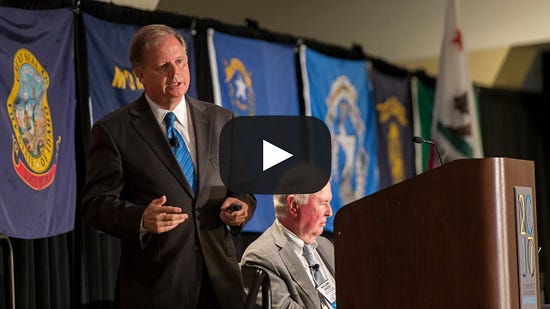A Opportunity to Meet an Outstanding Candidate for this Open Seat in 2024
On Monday, October 2nd, from 11AM to 1:00PM the Spokane County Democrats will host Washington State Senator and candidate for Washington State Insurance Commissioner Patty Kuderer at a buffet luncheon at the Longhorn Barbecue West at 7611 W Sunset Hwy. I spoke with her for nearly an hour in preparing this post. She is an impressive candidate with a compelling personal history. I urge those of my readers who can to sign up to meet with her over lunch. Click here to sign up and get a ticket.
Patty Kuderer was a practicing trial attorney specializing in consumer advocacy in the Seattle area for more than a decade when she, somewhat reluctantly, accepted an appointment to the Washington State House from the 48th Legislative District (Bellevue more or less) in 2015. Two years later she accepted an appointment to the Washington State Senate from the same district. She has served in the Washington State Senate since then, holding her seat in the 2018 and 2022 elections with 60 and then 70 percent of the vote, respectively. After talking with her, those sorts of margins are easy to understand.
Senator Kuderer signed up with the Public Disclosure Commission in May of 2023 as a candidate for Insurance Commissioner. A Republican opponent,Michele A Forgues Lackie” signed up in July. One must expect that the insurance industry will field and lavishly fund this or another opponent before the 2024 election.
Senator Kuderer’s tenure in the Washington State Senate demonstrates that she doesn’t just cast a vote, she does the real work of legislating. It was her bill, Senate Bill 5082, signed into law in April of this year, that finally rid us of the taxpayer-funded, wasteful Republican anti-tax propaganda of advisory votes, those puzzling, non-binding, useless choices that took up at least a page or two of every ballot we have filled out in this state for the last sixteen years. These advisory votes are just one of the products of the despicable Republican operative, Tim Eyman’s, efforts to subvert the initiative process in Washington State in the service of Republican propaganda. Senator Kuderer deserves high praise for her years-long effort to clean up Eyman’s tracks. If you have a few minutes I highly recommend watching Senator Kuderer’s presentation of her Bill to the Senate State Government & Elections Committee on January 10, 2023. Here’s the link. Slide the cursor to 33:00 minutes to witness the elegance of her presentation.
Getting rid of advisory is just one striking example (and obviously a favorite of mine) of legislation Senator Kuderer has toiled away on in the State Legislature. Come have with her on October 2nd to hear more. Again, here’s the link to sign up for lunch.
Senator Kuderer would make a superb Insurance Commissioner. She deserves our early support.
What Does the Insurance Commissioner Do? — Read On
According to Wikipedia only twelve states in the union elect a state insurance commissioner. The job of insurance commissioner in the State of Washington is an important one:
“The Washington State Insurance Commissioner is a public official responsible for overseeing and regulating the insurance industry within the state of Washington. This includes all types of insurance, ranging from home and automobile all the way to insurance for people’s pets. The Insurance Commissioner’s job also is to be the consumer advocate for the people of Washington state, protecting their interests and ensuring (no pun intended) insurance companies operating within the state comply with relevant laws and regulations.”
We ought to want an insurance commissioner equipped to strongly advocate for consumers in dealing with the morass that is health insurance in our state, to say nothing of the difficulties people are facing with some insurance companies in claims around loss of homes in climate driven disasters like our recent wildfires.
Current Washington State Insurance Commissioner Mike Kreidler, now age 79, has announced that he will retire at the end of his term in 2024 after 24 years. An optometrist by training, Kreidler’s path to insurance commissioner included stints in both the Washington State House and Senate (and a degree as Master of Public Health [MPH]).
I hope to see you on October 2 at the Longhorn barbecue.
Keep to the high ground,
Jerry

